Iodine is an essential mineral for proper function of your thyroid, which produces hormones that regulate everything from your body weight to your emotional stability and cognitive function. It’s also a common nutrition deficiency.
Iodine deficiency affects an estimated two billion people worldwide, and has only been fully controlled in five countries—all of them in central or northern Europe.
Keeping iodine levels in the correct range is critical for pregnant women, as iodine deficiency is associated with a range of very serious health problems in infants, but the importance of iodine is not limited to women of childbearing age.
Iodine deficiency (and excess) in adults is associated with an increased incidence of thyroid problems, including both hypothyroidism and hyperthyroidism.
Fortunately, with a good iodine supplement, an iodine deficiency is easy to correct, thanks to its strong bioavailability.
If you want to ensure your thyroid hormone production isn’t hampered by an iodine deficiency, check out our rankings of the best iodine supplements on the market. Our research team has evaluated and sorted these products according to iodine content and production quality.
Research
Rankings
1. Nature’s Way Kelp
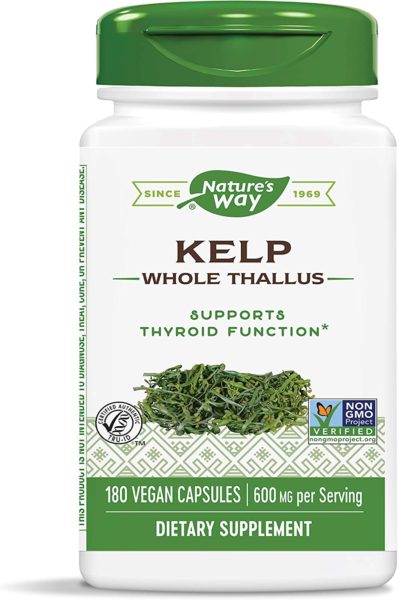
Nature’s Way delivers iodine in a natural and highly pure form: unprocessed kelp. This simple and natural source of iodine is surprisingly concentrated, with 300 micrograms of iodine per 600 milligrams of kelp in every capsule.
It’s a good choice if you want your iodine as close to its natural form as possible. With the solid dose and natural format, it’s the top overall iodine supplement.
2. Zhou Thyroid Support with Iodine
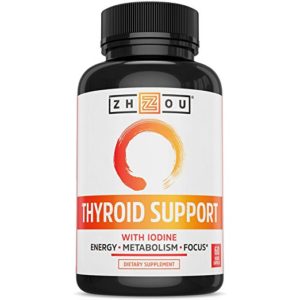
Zhou Thyroid Support is one of the best ways to get iodine along with other supplements that can support your thyroid function, like selenium, zinc, and ashwagandha.
This is a complete package for thyroid support that comes along with 150 micrograms of iodine. For a comprehensive thyroid solution, it’s a great choice, but if all you need is iodine there are better ways to get it.
3. Pure Encapsulations Iodine
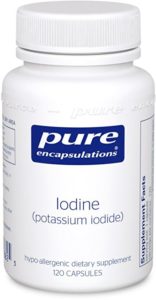
Pure Encapsulations makes a pretty straightforward iodine supplement that uses potassium iodide to provide 225 micrograms of iodine in a vegan-friendly cellulose capsule.
It’s hard to go wrong with this moderate-dosage and super-simple iodine supplement if all you need is a reasonable dosage.
4. J. Crow’s Lugol’s Solution

Among the liquid-based iodine solution, J. Crow’s is the best. It has a high concentration of iodine, and is used by many people with thyroid issues to address iodine deficiencies rapidly and effectively.
While it was originally developed to sanitize water, it’s easily mixed into shakes and smoothies, though it does leave a vaguely metallic taste in your mouth.
5. Benevolent Liquid Iodine
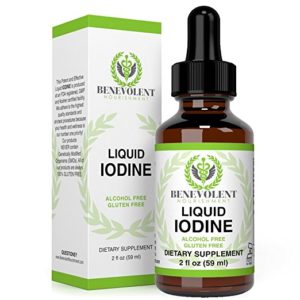
Benevolent offers a liquid iodine supplement, which is useful for people who can’t or don’t want to take pills. The liquid supplement is also useful for mixing into shakes, smoothies, and meal replacements.
One drop contains 150 micrograms of iodine, which means this bottle will last you a long time. The only problem this supplement has is one shared with all liquid supplements: it’s hard to measure out a precise dosage, so you don’t exactly know how much iodine you’re getting.
6. Life Extension Sea-Iodine
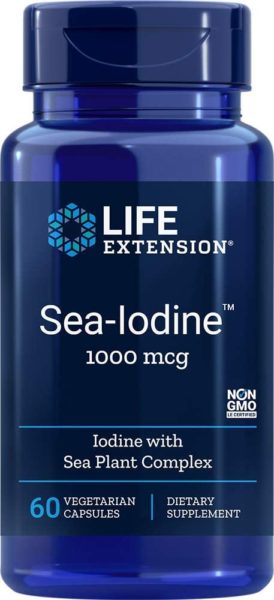
Life Extension delivers iodine in a complex of kelp and bladderwrack extracts. The supplement has a total of 1000 micrograms of iodine per capsule, which makes it a great way to rapidly increase iodine levels in your body.
Because it’s delivered in a natural form, it’s more bioavailable and provides some ancillary nutrients found in the ocean-based sources of these two extracts.
However, given its very high iodine dosage, you should only use it if you get very little iodine elsewhere in your diet.
7. Dr. Mercola Iodine
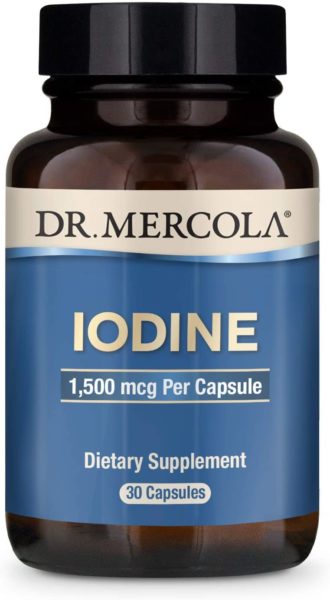
Dr. Mercola sells a very minimalist high-dose iodine supplement. It delivers 1500 micrograms of iodine, though all of it is in the form of potassium iodide.
It may not have the benefits of naturally-sourced iodine supplements, but it’s still a solid way to rapidly deliver iodine to your body, even if it’s a fairly blunt tool for doing so.
8. RLC Labs iThroid
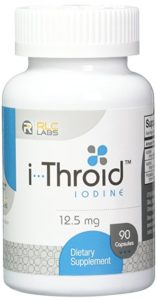
With 12500 micrograms of iodine per cellulose-based capsules, RLC Labs delivers a lot of iodine, both as potassium iodide and free iodine.
The dose is high, though it doesn’t offer quite the perks as some of the other high dose iodine supplements on the market.
However, the fact that this supplement exceed the recommended dietary intake of iodine set by the National Institutes of Health means that you should only use this if you’re specifically directed to take high dose iodine supplements.
9. Optimox Iodoral
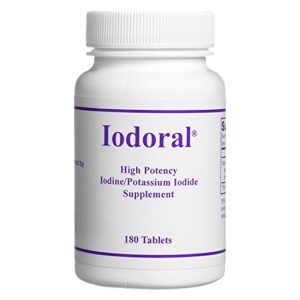
If you know you need a high dose of iodine to correct a deficiency, Iodoral should definitely be your top choice. With a whopping 12500 micrograms of iodine, in both potassium iodide and pure iodine form, this supplement delivers a massive dose of iodine to rapidly boost iodine levels.
Like other high dose iodine supplements, you should not take this for prolonged periods, and it should not be used by pregnant women.
10. Global Healing Center Detoxadine

Global Healing Center sells a liquid form of iodine that is in its pure atomic state. While the company claims that this is an ideal form for use in detox regimens, other nutritionists counter that salt forms of iodine, like potassium iodide, are easier to absorb by adults.
That, combined with the intrinsic weakness of liquid supplements in low concentrations (i.e. that they are difficult to measure precisely) detracts from Detoxidine’s spot in the rankings.
Category winners
Best iodine overall: Nature’s Way Kelp
With a solid dose of 270 mcg of iodine per capsule, Nature’s Way provides an excellent naturally-sourced and simple iodine supplement that’s a great all-around pick. If you want iodine in a natural form without any additives, this should be your choice.
Best iodine for thyroid health: Zhou Thyroid Support with Iodine
For thyroid health, our recommendation is Zhou Thyroid Support with Iodine, which provides kelp-sourced iodine alongside important trace minerals like manganese, molybdenum, and selenium, plus bladderwrack powder and cayenne pepper. These ingredients work synergistically to provide your body with the necessary compounds for optimal thyroid function.
Best iodine for women: Pure Encapsulations Iodine
Women who are pregnant or nursing often get their iodine from a prenatal supplement, but if you’re looking for a dedicated standalone supplement, Pure Encapsulations Iodine is a good fit. It has 225 mcg of iodine per capsule, making it spot-on for the recommended intake for women of childbearing age.
Best iodine from kelp: Nature’s Way Kelp
Looking for naturally-sourced iodine? Nature’s Way Kelp uses whole kelp plant material sourced from the arctic circle, making it the perfect choice for a potent, all-natural source of iodine.
Best liquid iodine: J. Crow’s Lugol’s Solution
Liquid solutions are a good way to get iodine if you want careful control over your dosage, or if you want to incorporate it into a shake, smoothie, or liquid meal replacement. There’s no topping J. Crow’s when it comes to liquid iodine; their solution is minimalist and effective.
Best iodine for people on a diet: Pure Encapsulations Iodine
If you’re on a low-sodium diet or another restrictive eating plan (like keto or Whole30), your iodine intake might be lower than it should be, since most people get their iodine from salt. Pure Encapsulations is a quick way to ameliorate this shortage, with 225 mcg of iodine with zero added sodium.
Who should buy iodine?
Iodine is important for neurological development and thyroid function. Iodine deficiency used to be a major health problem, prior to the introduction of iodized salt.
Thanks to the incorporation of iodine into table salt and commercially prepared baked goods, levels of iodine in the general population have been historically very high. However, some recent trends in diet and commercial food preparation have caused iodine levels among the general population to drop markedly (1).
So far, most peoples’ iodine levels are still sufficient to prevent health problems, but there is some concern that in special populations, iodine levels could become a problem.
People on a sodium-restricted diet, for example, might be at a greater risk for iodine deficiency if their primary source of iodine is table salt. Dramatic drops in salt intake could lead to an equal drop in iodine intake, and since iodine can be hard to get in a typical diet, an iodine supplement might be the right move to prevent iodine deficiency.
Similarly, people on very restrictive diets like keto, paleo, or Whole30 may need to evaluate whether they’re getting enough iodine in the foods that they eat. If not, using an iodine supplement is a much better option than adding salt to everything, given the widely known connection between high sodium intake and the development of high blood pressure—a major risk factor for cardiovascular disease.
A third and very important group of people who should consider a supplement with iodine in it is women who are pregnant. Deficiencies in iodine during pregnancy are associated with developmental problems and miscarriages.
While most prenatal vitamins do come with iodine in them, you should check with your doctor to see if you need to supplement your diet with additional iodine during pregnancy to ensure optimal health for your baby.
How we ranked
Since iodine is such a simple nutrient, we focused particularly hard on the source, quality, and dose of iodine in supplements that we evaluated. Iodine itself is never found in nature or in supplements, only salts of iodine bound up with other ions like sodium or potassium, called iodide salts.
While you could just get a plain tablet that provides iodine, we sought out supplemental products that provide advantages like having naturally sourced ingredients or additional ingredients that support thyroid function, if at all possible.
Forms of seaweed, like kelp, are excellent and all-natural sources of iodine, but using these directly as iodine sources is tricky. That’s because the iodine content is highly variable. So, our ideal product was one that used kelp or another ocean-based source for iodine, but controlled carefully the actual iodine content.
Plain iodine salts, like potassium iodide, did end up making our rankings as well as long as they had some additional redeeming qualities, like clean supplement design and a solid dose of iodine.
Speaking of dosage, we were ideally looking for products that provided approximately 100 to 300 micrograms (mcg) per serving. These doses are in line with what most people need to boost their iodine intake to optimal levels, without putting you beyond the tolerable upper limits that are recommended by the National Institutes of Health.
Notably, though, some people who take iodine for thyroid health are specifically looking for very high doses (circa 12,000 mcg per serving) to rapidly restore iodine levels. While we don’t recommend these as starting points for most people, we did rank the best high dose iodine supplements as part of our rankings.
A few small studies have also found large doses of iodine to be helpful for fibrocystic breast disease, so these higher dose products can be useful for this application.
However, because their dosage is too high for most people, we ranked these lower. Pregnant women, for example, should not be overloading on iodine, since the risks to your baby from excessive supplemental iodine are not well-known.
We also applied our typical purity and clean supplement design requirements. Products that were bloated with binders, fillers, and excipients got eliminated—iodine is rapidly absorbed, with over 95% of even a simple iodide salt getting pulled into your body within a few hours of ingestion. Because of this ease of absorption, we strongly favored simple products; iodine doesn’t need any other ingredients to boost its bioavailability.
One final consideration before we made our final list was delivery format. Most iodine supplements are capsules, though some come pressed into tablets and a few come in a liquid elixir.
Our research team generally feels that capsules are the best approach for most people: these keep the ingredient list short and simple. Tablets generally need binders and stabilizers to support pressing the tablet, and measuring doses of a liquid supplement is far less accurate than what you can get from tablets or capsules.
That said, we did consider the fact that liquid iodine is preferable for people who already take a lot of pills, or who have a hard time swallowing large capsules. And some of the simplest iodine supplements do come in tablets.
So, while the top places were secured by capsule-based iodine supplements, we did leave a few spots open for the best liquid and tablet based iodine supplements.
Benefits
Iodine is a critical nutrient for producing thyroid hormones, which in turn determine everything from your mood to your weight to your cognitive function. If you’re deficient in iodine, you’re not alone: billions of people have low iodine levels worldwide, despite the widespread addition of iodine to table salt.
According to research published in the Journal of Clinical Endocrinology & Metabolism, iodine intake has been declining in the United States in the last several decades, perhaps due to decreased use of sodium out of fears of increased blood pressure (2).
For some people, this can have negative consequences. However, iodine levels that are too high have health consequences too. It’s important to maintain the appropriate level of iodine for optimal health.
Iodine keeps your thyroid functioning properly. Thyroid disorders, like hypothyroidism, are directly linked to the prevalence of iodine deficiency. That’s according to research by Michael Zimmerman at the Swiss Federal Institute of Technology Zürich (3).
In an authoritative review that covered the detrimental effects of iodine deficiency at the population level, Zimmerman cited research that showed that chronically low iodine intake was linked to abnormal thyroid function, which has a number of negative health consequences, from mental retardation in infants and children to fatigue, weakness, and emotional instability in adults.
Iodine supplementation during pregnancy improves fetal health. During pregnancy, iodine levels play a vitally important role in cognitive development, so much so that medical authorities recommend iodine supplementation (either in supplemental iodine tablets or in fortified table salt) among women who are pregnant or intend to become pregnant in the near future (4).
If iodine levels are not optimal during pregnancy, there is irreversible damage to the cognitive abilities of your infant, according to research conducted by Maureen Black at the University of Maryland School of Medicine (5).
Women who are pregnant should not take too much iodine. As with many supplements, there can be such a thing as too much of a good thing.
A large cohort study conducted in China found that excessive iodine intake is also linked with hypothyroidism, possibly due to an increased risk of autoimmune problems affecting the thyroid (6).
High dose iodine supplements should not be taken by pregnant women unless under a doctor’s orders because of the risks of excessive iodine intake.
Iodine supplements can protect you from cancer in the event of a nuclear accident. Far-fetched? Perhaps, but iodine supplements are stockpiled in all major cities for precisely this reason.
After accidents at nuclear power production facilities, radioactive iodine is released into the atmosphere. When it gets into your body, it’s rapidly absorbed by your thyroid, and can cause thyroid cancer.
Following the Chernobyl disaster in the USSR, iodine supplements were distributed in Poland, which prevented an increase in thyroid cancer in the years afterwards (7). Other countries nearby which did not use iodine in the same way observed a significant increase in thyroid cancer following the nuclear disaster.
Cutting salt out of your diet can create iodine deficiency, but an iodine supplement can reverse it. Ever since excessive sodium intake was linked to high blood pressure, and by extension, an increased risk of heart disease, salt intake has declined.
A study published in 2010 in the American Journal of Hypertension noted that this decrease in sodium intake would necessarily lead to a decrease in iodine intake, because for many people, their primary source of iodine in their diet is through fortified salt (8).
According to the authors, women are particularly vulnerable to iodine deficiency that is the result of dietary salt restriction. The authors recommended that women (and possibly men as well) who are restricting their salt intake to decrease their blood pressure consider taking an iodine supplement to maintain adequate iodine levels.
If not, they could be at a higher risk for thyroid disorders. Fortunately, iodine is typically delivered in the form of potassium iodide, which has no tendency to raise blood pressure, even at the amounts in the highest-dose iodine supplements.
High dose supplementation with iodine might be able to help women with fibrocystic breast disease. Some women have painful, fibrous lumps in their breast that cause dull pain and irritation, often in conjunction with the menstrual cycle.
These lumps can be worrying, because many women think they might be breast cancer. Once they’ve been diagnosed as benign, though, it might be worth trying a high dose iodine supplement to relieve symptoms.
A few small studies support the idea that doses of 4000 to 6000 mcg of iodine per day can improve the symptoms of fibrocystic breast disease. One study, for example, found that 50% of the women who were randomly assigned to receive a high-dose iodine supplement experienced a significant improvement in their symptoms, as measured by a standardized pain scale (9).
Analysis by researchers at the National Institutes of Health’s Office of Dietary Supplements notes that results from these small studies are promising, but they require further study (10). Additionally, even though these studies found no major adverse effects from the high iodine doses, they are far in excess of the 1100 mcg upper limit that is known to be safe.
The ODS researchers recommended only trying high dose iodine supplementation for fibrocystic breast disease under the guidance of a physician.
Side effects
The side effects of iodine supplements can be serious, but only when massive doses of iodine are taken on a regular basis.
As noted earlier, very high doses of iodine in pregnant women have been associated with an increased risk of hypothyroidism during pregnancy, which can have negative health consequences for both the mother and the infant.
Some other thyroid problems, such as goiter, have been reported among people with extreme iodine intakes, though it requires massively exceeding recommended iodine intake levels (11).
The Office of Dietary Supplements at the National Institutes of Health has established upper limits of iodine intake of 1100 micrograms of iodine per day for both men and women.
You shouldn’t exceed this limit, since it may increase your risk of thyroid problems (12). Keep in mind that this is the limit for all iodine in your diet, not just your supplemental iodine intake.
Recommended Dose
Given its role in public health, the optimal dose of iodine for health is very well-understood, and has been determined for various different demographics.
According to the Office of Dietary Supplements at the National Institutes of Health, adult men and women need a minimum of 150 micrograms of iodine every day.
In women who are pregnant or breastfeeding, this jumps to a minimum of 220 micrograms per day. Iodine is fairly rare in foods that aren’t intentionally fortified, so it’s important that you make sure you’re getting at least the minimum recommended dose for optimal thyroid health.
FAQ
Q: What is iodine good for?
A: Iodine supplementation serves a few key purposes in your body. First off, it’s a critical component for proper thyroid function. Imbalances in iodine intake (too little or too much) can throw off your thyroid hormone levels, so iodine is a key ingredient in many thyroid supplements.
Second, if you are pregnant, thyroid is very important for proper development of your baby’s central nervous system. Any good prenatal vitamin should have iodine in it; if you aren’t sure if you are getting enough iodine in your diet and supplementation as-is, you should talk to your doctor about whether a dedicated iodine supplement would be a good idea during pregnancy.
Finally, though it’s a more niche application, high dose iodine supplements have found use among women who experience pain from fibrocystic breast disease. Iodine supplementation might be able to reduce the dull, intermittent breast pain that’s associated with this condition.
Q: How much iodine is too much?
A: According to the National Institutes of Health’s Office of Dietary Supplements, excessive iodine intake can cause many of the same problems as low iodine intake: thyroid problems and dysregulated thyroid hormone levels (13).
The tolerable upper limit for iodine is 1100 mcg per day for male and female adults; iodine intake above this level can increase your risk of adverse side effects. At the same time, a few specific supplementation routines (most notably for fibrocystic breast pain) call for iodine supplementation doses above this level.
Researchers recommend talking with your doctor to see if these “”supraphysiologic” doses of iodine make sense for you.
Q: Can iodine kill infections?
A: Iodine is often used in a tincture to kill bacteria on your skin after a cut or a scrape. Surgeons also use it to disinfect skin before making incisions—though in this case part of the benefit is the dark brown coloring it leaves on the skin, making it obvious to see what’s been disinfected and what has not.
Unfortunately, these antibacterial benefits outside your body don’t translate to inside your body. There’s no evidence that taking an iodine supplement can fight infections in your body, and iodine tinctures that are prepared for wound care are not suitable for use as a source of supplemental iodine either.
Q: What foods are high in iodine?
A: Iodine is pretty hard to get in your diet if you don’t eat seafood—that’s the whole reason iodine was added to table salt to begin with.
Seafood like fish, oysters, and especially kelp are excellent sources of iodine, though the actual concentration even in a given type of food can vary quite a bit (e.g. from one fish to another). You can also get iodine in cheese, milk, and other types of dairy, though the iodine content in these products is contingent on the iodine content of the animal feed that the cows were fed.
Prepared foods, like breakfast cereal and bread, often have a good amount of iodine because the salt or the flour used to manufacture these foods has iodine added to them. Again, though, the iodine content of these products is entirely dependent on the presence of added iodine in the ingredients.
Not all companies use iodine-fortified flour, for example; health experts have connected decreasing usage of iodized flour and animal feed with substantial drops in the average iodine levels among the population.
Q: How much iodine is in salt?
A: Salt that has been iodized has 45 mcg of iodine per gram of salt (14). If table salt was your only source of iodine, you’d meet recommended iodine intake levels if you consume typical amounts of salt in your diet.
People can run into issues with relying on salt for their iodine intake, though, because too much salt is not good for your heart health. If you cut your sodium intake down to less than 1.5 grams per day (which is what’s recommended by the American Heart Association for optimal heart health (15)) you might push your iodine intake below recommended levels if you don’t get iodine elsewhere in your diet or supplementation routine.
Similar problems can arise if you use primarily sea salt or kosher salt as opposed to sea salt: neither of these types of salt have iodine, so switching to more natural variants of salt might drop your iodine intake too.
Q: How long does an iodine supplement last in your body?
A: Iodine supplements are absorbed very rapidly and very effectively (>95% of an iodine supplement is absorbed), although how long it lasts in your body actually depends on what part of your body that you are talking about.
Researchers use a metric called the elimination half-life to assess how long a supplement, vitamin, or mineral lasts in your body: this number measures how long it takes for half of the initial dose of a supplement to be eliminated.
According to a scientific report from Los Alamos National Laboratory, the elimination half-life of iodine in the blood is six hours in the blood, but 12 days in the rest of the body aside from the thyroid. In the thyroid, iodine has an impressive 80 day elimination half life, emphasizing the importance of iodine to thyroid function (16).
The good news is that once you get your iodine intake to optimal levels, your thyroid should be fairly resistant to short-term interruptions in iodine intake due to the long elimination half life of iodine once it makes it to your thyroid.
Related articles
Recap
Iodine plays a critical role in the synthesis of thyroid hormones. There’s a fine balance between the right amount of iodine and too much: in both cases, thyroid health is negatively affected, which can have both physical and mental health consequences.
Iodine levels are particularly important for women who are pregnant or breastfeeding, as iodine plays a critical role in infant development. These women should pay particular attention to their iodine levels and should take a moderate-dose supplement if their iodine intake is below the recommended 220 micrograms per day. If you are restricting your sodium intake, you are at particularly high risk of iodine deficiency, and you should strongly consider an iodine supplement.
All people should also be mindful not to exceed 1100 micrograms of iodine per day, as iodine intakes above this threshold are also associated with thyroid problems.
For BodyNutrition’s #1 iodine recommendation, click here.